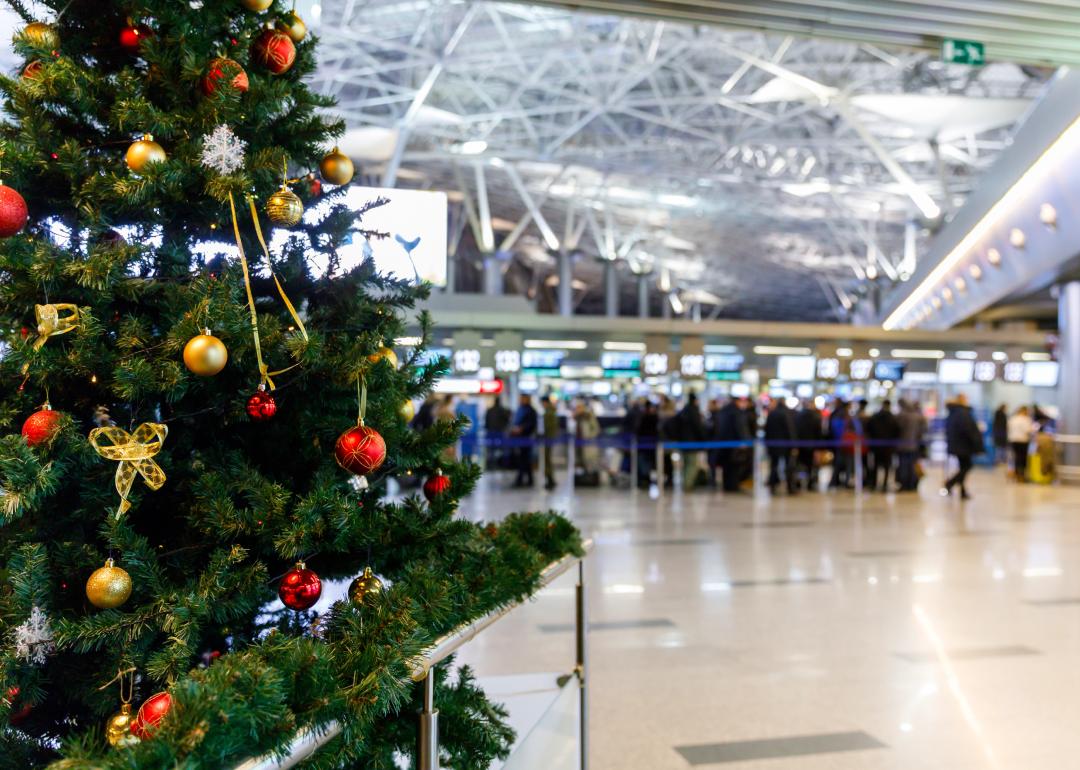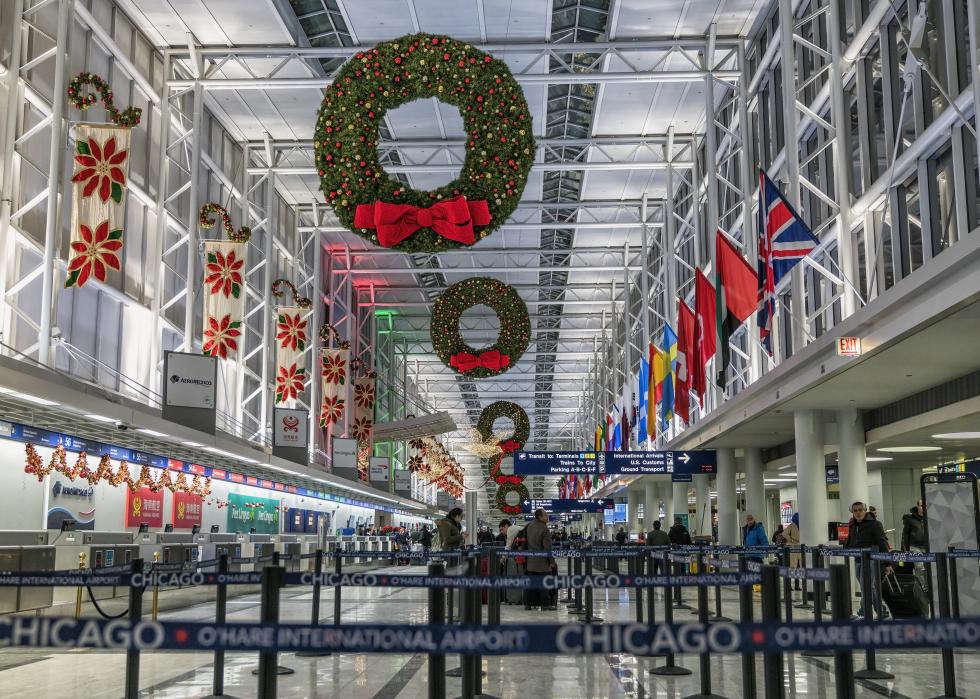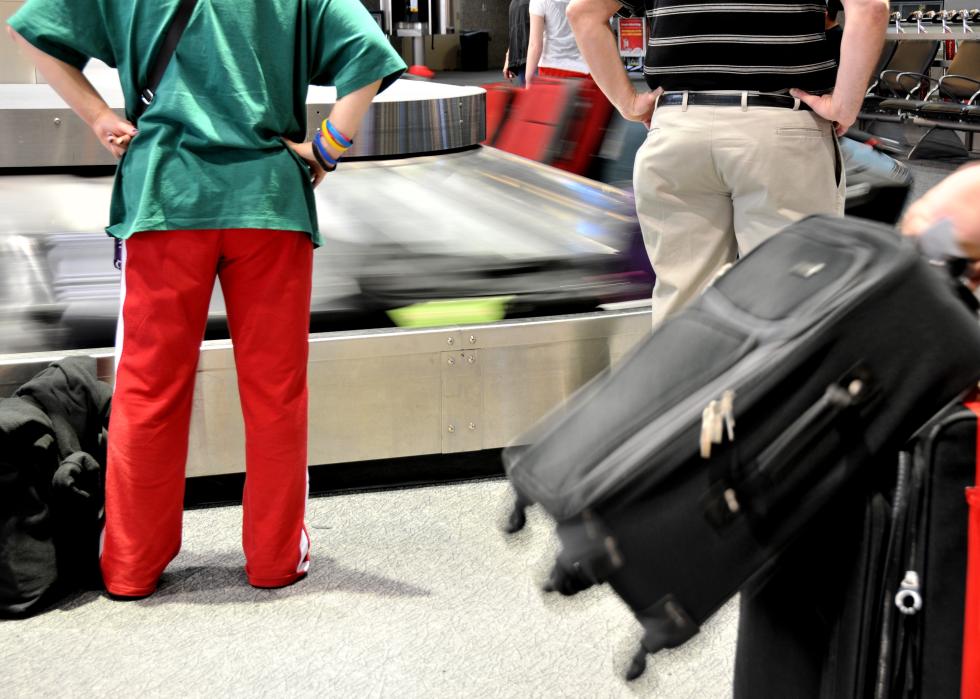
Inflation's toll on 2023 holiday plans—and how American travelers have changed
This story originally appeared on CoPilot and was produced and distributed in partnership with Stacker Studio.
Inflation's toll on 2023 holiday plans—and how American travelers have changed
Rounding out 2023, 1 in 3 American holiday travelers are worried about spreading their budgets too thin due to inflation or rising prices, according to Bankrate. The worries are well-founded. Americans face a triad of financial pressures between interest rates climbing to a 23-year-high, the return of student loan repayments, and core inflation remaining high—though thankfully, inflation has sharply decreased from mid-2022 when rates were at the highest they'd been in 40 years.
Still, nearly half of Americans plan to travel for the 2023 end-of-year holiday season, according to a Deloitte holiday travel report. But their plans in 2023 may look different than other years. According to Bankrate, 77% percent say they are likely to change their winter holiday plans, citing inflation or rising prices that have remained inflated post-pandemic.
CoPilot looked into how inflation and consumer attitudes throughout 2023 are impacting Americans' holiday travel plans using reports from Deloitte and Bankrate, and other media sources.
Reddit user yankinwaoz said they canceled vacation plans outright this year, taking precautions for a pricey 2024 while their income is expected to remain the same. "We only see our life getting more expensive. Our grocery bill is going up. Gasoline is over $6/gallon … I noticed today that my 401k dropped $60K in value overnight. I feel like I'm going backwards," they wrote. "I can't justify spending $4K on a vacation somewhere."
Vacationers may also still painfully remember end-of-year-holiday travel in 2022, when millions of Americans were stranded after about 17,000 flights were canceled due either to natural disasters like winter storms—or human-made fiascos—like when Southwest Airlines' scheduling system crashed, fueling a federal investigation.

Revenge travel has waned, but the spirit of exploration remains
Which Americans are traveling this holiday season and the choices they make around travel are markedly different in 2023. More Americans are traveling to reconnect with loved ones rather than for "revenge travel," according to Deloitte.
Revenge travel, a phrase that started in social media circles and refers to the intentions of travelers to make up for trips lost during the COVID-19 pandemic, is dying down. For summer 2023 travel, 19% of those surveyed were motivated to take long trips after the pandemic paused travel, versus 12% for the end-of-year holiday season in 2023.
The other motivational categories for travel all increased: time with friends and family, rest and relaxation, and time with a partner or spouse for romance. Deloitte surmises that while revenge travel appears to be trending downward, "the recent restricted years seem to leave behind a legacy of enthusiasm for exploration." Among Americans planning to take international trips, quite a few are looking to travel to South America and Asia.
More baby boomers are traveling again after more sustained restrictions than other age groups. Last year, older Americans avoided holiday travel due to potential travel disruptions and health concerns. One in 3 Boomers are traveling during the winter holidays compared to 1 in 5 in 2022.
While more Americans are pining to travel for the holidays, trips will be fewer and shorter. Travel will hover around the timing of major American holidays, though only 5% will take extended trips in 2023, down from 13% last year.
Budgets, however, have both decreased and increased in equal amounts. Eighteen percent of Deloitte's survey respondents say their trip budget is significantly less in 2023. Of those who cut their budgets, 1 in 5 say their reduced spending will be spread across shorter trips or saving towards a bigger trip. Another 18% of respondents, however, report significantly higher budgets. One in 5 of those who allocated larger budgets now see more value in travel since the pandemic.

Amid cooling inflation, travel costs have dipped—slightly
Inflation and interest rates affect groups differently across locations, ages, incomes, races, and ethnicities. According to the Federal Reserve Bank of New York, Black, Hispanic, and middle-income households were the most affected largely because they spent the most on transportation, which led inflation in 2021. Yet while inflation's impacts are inequitable, Americans across income strata are feeling it. Bankrate's survey of Americans on finances during the holidays shows that at least a quarter of every income group reported worries about straining their budget.
Recently, however, travel costs have become relatively restrained. According to NerdWallet's Travel Price Index, which tracks the change in travel prices against pre-pandemic levels, travel costs are down 2% when compared to the same month in 2022, but still 10% above October 2019 levels. In other words, expect a trip around this time to cost a bit less than a trip around the same time last year, but still more expensive than it was pre-pandemic.
Lindsay Schwimer, a spokesperson from travel booking site Hopper, told CBS News, "We've seen a shift back to normalcy in terms of prices, and a lot of the domestic airline capacity has come back to what we saw pre-pandemic, which means more planes flying than what we saw in past few years."
With the continuation of remote or hybrid working for some Americans post-pandemic, some took advantage of a longer Thanksgiving break to spend more time with loved ones, also avoiding peak travel days.
Sophie Gardner and her husband, who are based in Chicago, utilize their flexible work arrangements around holidays like Thanksgiving and Christmas to drive up to Minnesota when the roads are clear. Gardner, who is a Director of Operations at Arabella Advisors says, "A flexible work schedule allows me to stay on top of my professional priorities while taking advantage of time with loved ones in the evening hours and on the weekend."
Five travel days have been tacked onto the holiday season on average due to remote work, according to Deloitte.

Hello, revenge inflation spending
Americans are also surprising economists with the levels of spending vs. saving despite the economy, according to Wall Street Journal consumer trends reporter Rachel Wolfe. She reported that while Americans are penny-pinching on everyday purchases by buying cheaper products or switching to generic brands, they are also spending on large-ticket items in what some people are calling "revenge inflation spending."
"People do feel like they have a score to settle with inflation," Wolfe told Your Money Briefing host J.R. Whalen. "They want to reclaim agency over their finances. They still have a job and want to feel like they live a good life. And so, they're splurging on these more expensive items in order to feel like they still have an income."
Wolfe reported speaking to a woman who has been concerned about money lately. To save, she cut back on therapy, plus canceled beauty appointments and media subscriptions—yet she still bought a last-minute trip to Cabo San Lucas, Mexico, saying "It feels good, and I'm just going to do it."
A thread on Reddit echoed the "YOLO" sentiment in the face of housing inflation, where prices have continually increased for 12 years. User vblade2003 said, "Yep, when the system is rigged against you anyway, may as well enjoy life to the fullest. Take that life-changing trip to Europe, Asia, wherever instead of paying $1 million for a $400K house. Easiest choice ever."
Fortunately, the airline industry was ready for a peak in 2023 for travelers. On the Sunday following Thanksgiving, the TSA hit a new record for the second time in the year as 2,907,378 people were screened at U.S. airports nationwide. The airlines only had to cancel less than 260 scheduled flights even as a cross-country storm delayed more than 900 flights in Chicago, in a major improvement from the last end-of-year holiday period in December 2022 when Southwest canceled more than 16,000 flights.
For those who haven't booked a flight for the holidays yet, NerdWallet reports that Dec. 20, 27, and 30 are the top three busiest days in airports in the last four years, according to TSA checkpoint data. Steer clear of those days and book a deal when you see one. Remember, customers are allowed to cancel reservations within 24 hours of making a booking with no penalty.
Story editing by Carren Jao. Copy editing by Tim Bruns.



